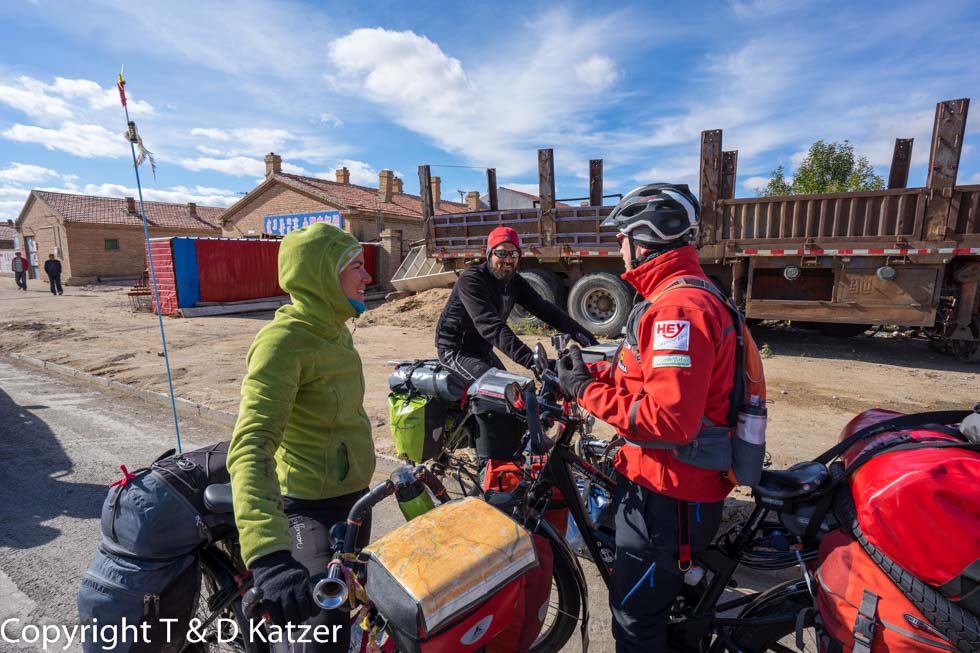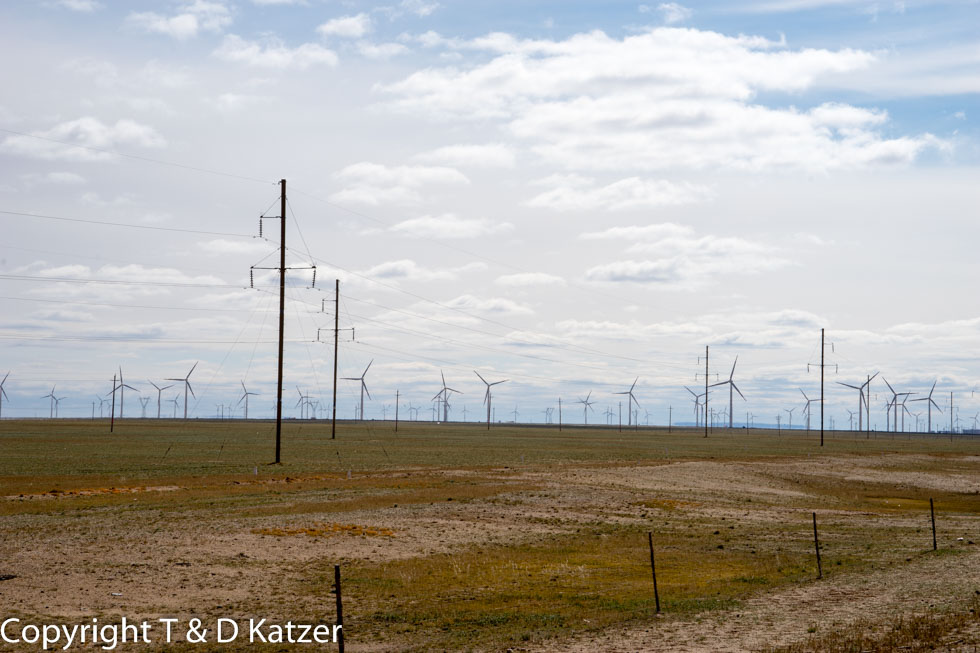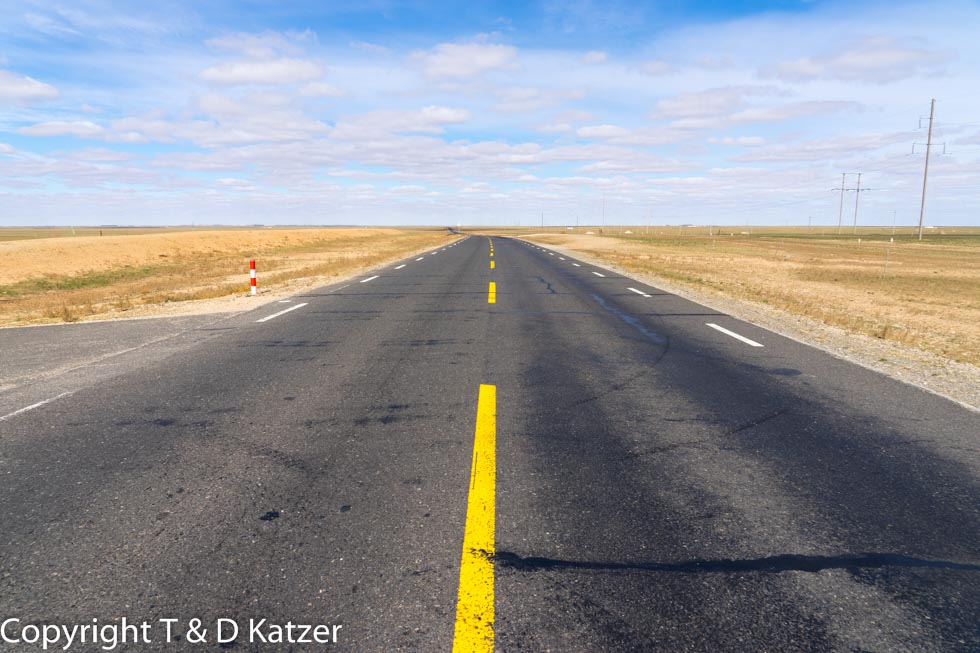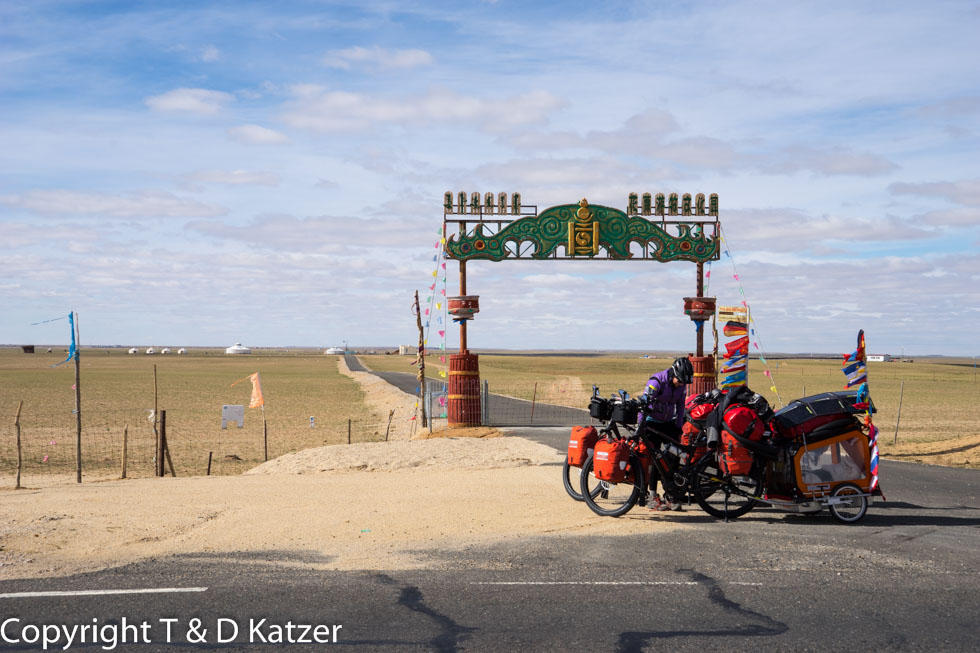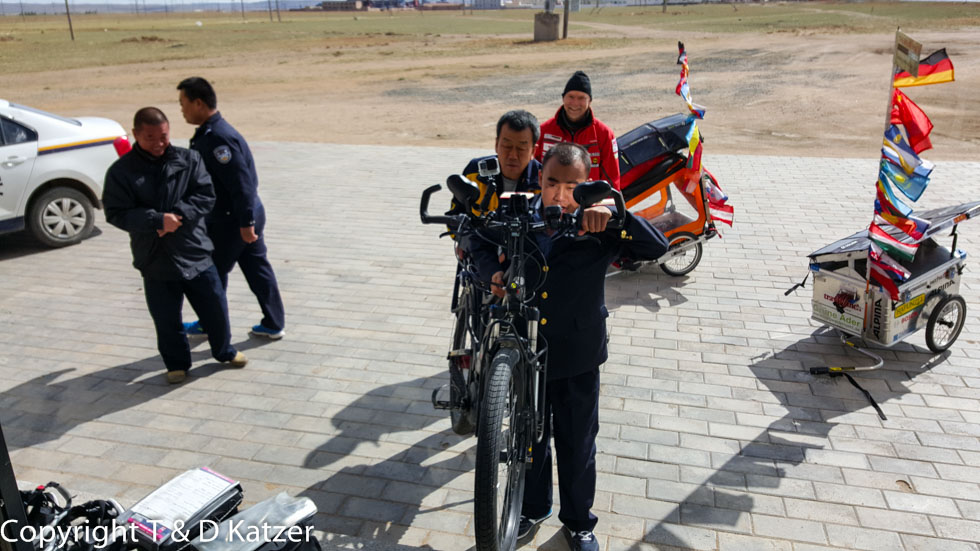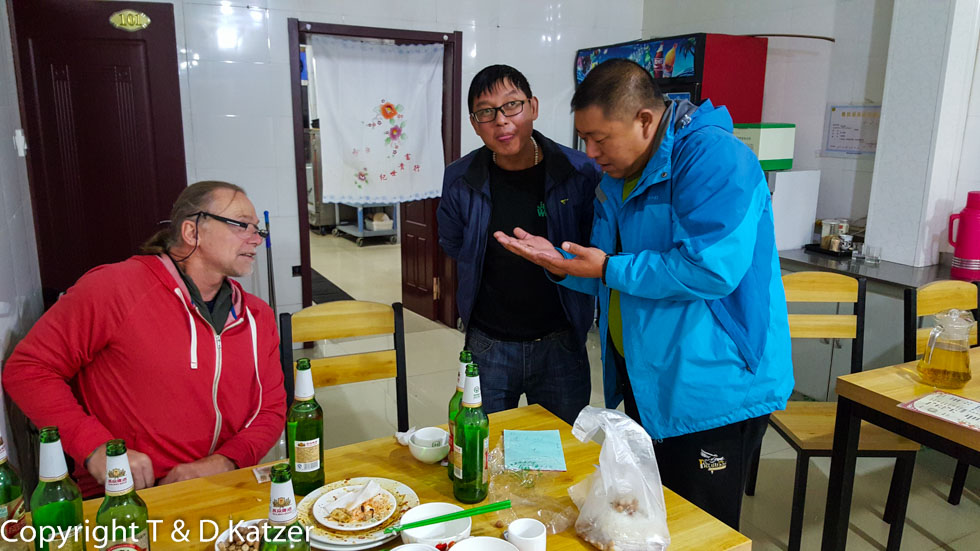
Encounters and the Chinese police your friend and helper
N 42°24'38.7'' E 112°53'31.3''
Date:
10.10.2015 to 11.10.2015
Day: 104 – 105
Country:
China
Location:
Zhurihe
Latitude N:
42°24’38.7”
Longitude E:
112°53’31.3”
Daily kilometers:
48 km
Total kilometers:
9,544 km
As the crow flies:
44 km
Average speed:
24.8 km/h
Maximum speed:
42.5 km/h
Travel time:
2:01 hrs.
Soil condition:
Asphalt
Maximum height:
1.090 m
Total altitude meters:
4.530 m
Altitude meters for the day:
55 m
Tailwind Wind force: 5
40 km/h
Sunrise:
07:33 am
Sunset:
6:57 pm
Temperature day max:
12 C°
Temperature day min:
minus 2 °C
Departure:
10:00 a.m.
Arrival time:
1:00 p.m.
Total plate tires:
7
Plate front tire:
2
Flat rear tire:
4
Plate trailer tire:
1
(Photos of the diary entry can be found at the end of the text).
The thermometer is at minus 1 °C as we carry our bikes, trailers and equipment out of the house. I’m just about to get Tanja’s bike ready when my eyes fall on the mudguard. It broke smoothly in two. “Look at this,” I say to Tanja, who is just bringing a couple of saddlebags. “What a bummer. How did that happen?” “I wish I knew. Maybe the cold made the material tired? Or the constant vibrations are responsible?” I guess. “Can it be taped?” “Could be,” I reply and tape the two parts that are still attached together with duct tape. “I don’t know how long it will last, but it should be fine for a few days,” I say with conviction and click the saddlebags into place.
At 10:00 a.m., the rubber turns under us through the city. “Is the direction right?” asks Tanja. “I’m not sure. The road seems to end there,” I reply, pulling the brakes to check the way out of town in MAPS.ME. “Here come the cyclists!” Tanja shouts happily and waves. A young couple from France stops next to us. We exchange the usual questions about where from, where to and how long you’ve been on the road. “We set off at the beginning of June and traveled a bit through Russia. When we ran out of time, we took the Trans-Siberian Railway to Irkutsk. From there, we cycled into Mongolia and then got caught out by a snowstorm. The locals helped us. We traveled the last 100 km to Ulan Bator by bus. It was simply too cold and there was too much snow. As the approaching winter is breathing down our necks and we only have a two-month visa for China, we want to get to Beijing as quickly as possible. From there, we’ll take the train to the south-western province of Yunnan and cross the border into Vietnam. I hope we can take a little vacation there. We urgently need a break. My knee is totally overworked and the cold doesn’t do it any good. With the temperatures here, we don’t want to sleep in a tent either. On the way to Beijing, we need towns with accommodation. Unfortunately, there doesn’t seem to be anything for the next 160 km. That means we have a tough day ahead of us,” she says. “Yes, according to the map, Zhurihe, which is about 50 km from here, is just a small hamlet. I don’t think we’ll find anywhere to stay there either,” I agree with her. “If you want to go to Beijing, why are you coming to meet us?” I wonder. We have been driving back and forth for half an hour to find the G208. “There’s a dead end up ahead. The road ends in the desert. “We’re looking for the G208 too,” I reply, and we continue our search together. It doesn’t take long and we’re rolling south together on the G208 country road. The strong desert wind pushes against our backs at 40 km/h. Although we would have liked to have covered a few more kilometers together, we have to stop to give Ajaci the run he needs. “If there’s a street café in the next town, we’ll leave our bikes in front of it. Then you’ll find us and we can have lunch together,” suggests the bright Frenchwoman. “Good idea. See you soon then,” we reply and wave after them.
As soon as we stop on our further journey, the icy breath from Mongolia whistles through our limbs. A reason to keep the tires spinning. So we move like in a bubble. On the trestle you could be forgiven for thinking there was no wind. Basically a rare ideal situation for every long-distance cyclist. The Chinese use the wind phenomenon of the Gobi to generate energy. They have placed wind turbines in the desert as far as the eye can see, their rotor blades spinning incessantly. It is certainly a good idea to use the unlimited wind of a desert to generate energy, but the landscape is totally spoiled with the high-voltage pylons and many power cables. It seems that there is always a dark side to any energy production. Above all, I wonder what will happen when the countless wind turbines get old and have to be dismantled and disposed of. I can well imagine that it will then be a desert full of wind turbine corpses.
At around 13:00, the wind blows us into the village of Zhurihe, which is indicated on the map with just a few houses. Right at the entrance to the village there is another rectangular concrete bunker emblazoned with red Chinese characters. Ugly air conditioning boxes hang from the windows, suggesting that there really is a hotel here. Because we are totally tired, probably due to the cold, the wind and yesterday’s long stretch, we hope we won’t have to cycle another 118 km to the next town today. With a slight palpitation, I put my bike on the stand and enter the house. “Ni you shuangren fangjian kongyu de ma?” (Do you have a double room available?), I ask the woman behind the counter. Of course she doesn’t understand a word. I put my phrasebook on the table and point to the sentence written in Chinese. “Bu!”, (No) I hear and am disappointed as this means we have to continue our journey today. Then she taps her shoulders, forms an imaginary cap with her hands and stretches out her arm towards the village center. “I have to go to the police? We have to register there?” I ask in similar gibberish. “Shide” (yes), she replies. Back outside the hotel, I explain to Tanja what I think I have understood. Then a Chinese man appears and points to his minibus. We understand. “Take your passports with you,” he asks us kindly. While I look after the bikes, Tanja and the hotel manager drive to the police station. Less than ten minutes later they appear again. “And did it work?” I ask excitedly. “They weren’t there. They’re probably at dinner.” “So we’ll wait?” “I’d suggest it,” says Tanja and we sit down in the warm, sun-drenched glass porch of the hotel. After 15 minutes, I ask if I can see the room in the meantime. It is spacious and also flooded with sunlight. A nice place to relax for the afternoon. I’m just back in the glass porch when a police car roars into the parking lot. The doors burst open and four uniformed officers come purposefully towards us. If I didn’t know that we hadn’t done anything wrong, my heart would be in my pocket by now. “Passports!” demands the boss, while his colleagues pull out their cell phones to take photos of us and our bikes. Meanwhile, the man with the most stars on his shoulder takes pictures of the passports and visas with his cell phone and hands them back to us. The manager, who had recently told me that our bikes would have to spend the night in the backyard, orders them to be stored indoors. In a joyful mood, all the policemen suddenly lend a hand and carry the bikes and trailers into the glass porch. We say goodbye to the friendly gentlemen with a handshake. “I can’t believe how nice the policemen are,” I say enthusiastically, happy not to have to go any further today. When Tanja wants to pay for our room, the manager wants double again. “240 yuan?” (€33.34) Tanja asks in astonishment, whereupon the price suddenly remains at 120 yuan (€16.67) as agreed.
We are enjoying the afternoon in our sun-drenched abode when the ringing of my phone startles us. “Ah Spring. How are you?” I ask, recognizing her voice. “Very good Denis. I just wanted to let you know that your package has arrived in Erenhot.” “That’s fantastic. Do you have any idea how we can get to the trailer drawbar?”. “That’s no problem. I’ll send it to you on the local bus”, which is why we decide to spend tomorrow here at short notice to wait for the important spare part. “Jump?” “Yes?” “You did a fantastic job organizing that. Thank you so much.” “It was a pleasure,” replies the extremely helpful and intelligent woman.
In the evening, we sit in the simple restaurant, which doesn’t look particularly inviting with its ghastly white tiles and uncomfortable wooden chairs. The receptionist and the manager’s wife go to great lengths to fulfill our wishes. The cook and another relative of the family also gather at our table and do everything they can to please the foreigners with their lousy language skills. At the end, a wok-cooked tofu dish and vegetables with finely chopped chicken are steaming on our table. “It was excellent”, (Jintian de fancai tai bang le) we praise. A businessman is sitting one table away. The only guest next to us. We start a rudimentary conversation. Then he buys us two beers and flatly refuses a return invitation. “Ganbei!” (cheers), we toast again and again. “Do you have European coins?” he asks in the course of the conversation. I happen to have a few jingling around in my money belt. When I show it to him, he is so enthusiastic that he wants to buy the 3 ½ euros from me for 100 yuan (€13.89). “I won’t accept it, but I’ll give it to them,” I say, happy to be able to make the generous man happy.
The next day, we hear loud honking in our room. The intercity bus is actually on the G208. A Chinese man jumps out and hands our parcel to the hotel manager who is hurrying over. It’s fantastic how a parcel like this finds its owner within the country for just 20 yuan (€2.78)…
The live coverage is supported by the companies Gesat GmbH: www.gesat.com and roda computer GmbH www.roda-computer.com The satellite telephone Explorer 300 from Gesat and the rugged notebook Pegasus RP9 from Roda are the pillars of the transmission.
